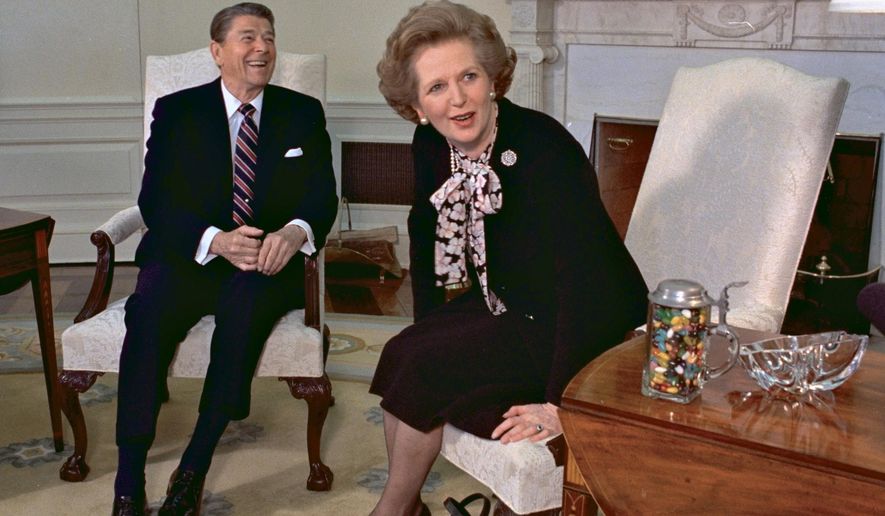The 100th anniversary of Margaret Thatcher’s birth is being marked in the United Kingdom and around the world with a series of events celebrating the influence of the first woman to be British prime minister.
As a politician, Thatcher is best remembered on both sides of the Atlantic for her foreign policy successes — most notably victory over Argentina in the Falklands War of 1982 and her partnership with President Ronald Reagan, which helped end the Cold War. Her stern anti-communist stance and uncompromising leadership style earned her the nickname “Iron Lady” from Soviet propaganda.
Her father ran a grocery and tobacco shop in Grantham, where she was born on Oct. 13, 1925. She would go on to serve the longest continuous term of any British prime minister in more than 150 years. Grantham has marked her centenary with a “Thatcher Festival,” featuring tours of her former school — complete with glimpses of her old report cards — and an exhibit of postcards reflecting on the Thatcher years.
Meanwhile, the Margaret Thatcher Centre, a London-based think tank, is planning a policy conference on her ideas next month, followed by a gala dinner at the elite Carlton Club in December. Her centenary has also been marked with a statue in Budapest and a commemorative dinner in Hong Kong.
Thatcher studied chemistry at Oxford and briefly practiced the profession before turning to law and politics. Her example continues to loom large in the British political imagination.
Rishi Sunak, the most recent Conservative to be British prime minister, invoked her spirit in a 2023 speech to the Conservative Party, casting still it as the party of the “grocer’s daughter.” That same year, Keir Starmer, leader of the opposition Labour Party, praised Thatcher in an op-ed.
Earlier this month at the Conservative party conference — 41 years after Thatcher’s first major address — attendees celebrated her centenary with a “Maggie’s 100th” themed party and a display of her iconic outfits.
Some argue that Thatcher’s legacy looms too heavily over the party, and polling shows it now trails both the ruling Labour party and Reform UK, an alternative right-wing party focused on immigration.
“Nostalgia for Thatcher is not surprising given the recent period when the party was in power for 14 years, which was not a happy one,” said John Whittingdale, a member of Parliament. “From David Cameron to Boris Johnson, we’ve had a series of Conservative leaders who, in various respects, left office having failed.”
“Thatcher won three general elections and lost none. She was seen as transformative for both the Conservative Party and the country,” said Mr. Whittingdale, Thatcher’s former political secretary.
In the United States, conservative politics has lived for decades in the shadow of Reagan’s legacy. Thatcher and Reagan’s tenures roughly coincided.
Mr. Whittingdale was one of a number of British conservative figures who attended an Oct. 3 commemoration event in Budapest, where a new statue of Thatcher was unveiled — not far from where a statue of Reagan stands. The two leaders worked closely together in bringing an end to the Cold War.
“It was Thatcher who first spotted Mikhail Gorbachev as a rising political star — someone, in her famous phrase, ‘We could do business with,’” said Mr. Whittingdale, reciting an oft-quoted line from a television interview.
Both Thatcher and Reagan, a former Hollywood actor, understood how to use their public image for diplomatic effect and embraced the camera.
President Trump, in many ways, has inherited the same instinctive understanding that good stagecraft is also good political strategy. Media attention can serve as both shield and sword.
“A strong relationship between the British prime minister and the U.S. president was central to her view of foreign policy,” said Mr. Whittingdale. “I think they would have got on. Mr. Trump would have admired her strength, and the prime minister would have recognized him as a strong leader.”
However, there were areas — most notably on free trade — where Thatcher and Trump would have disagreed, experts say. Despite her strong partnership with Reagan, she occasionally clashed with the American president, most notably over the U.S. invasion of Grenada in 1983, a Commonwealth country whose head of state was the British monarch.
“I think she would have been deeply concerned by the way the rule of law is being threatened in the United States,” said Gillian Shephard, who served in various posts under Thatcher.
Ms. Shephard, who has written a book on her legacy, stressed that the former prime minister was a firm believer in democracy and constitutionalism.
“She was a democrat to her roots and believed in the power of Parliament and constitutional government,” said Ms. Shephard.
She also noted that Thatcher understood she was a transformational figure — not only changing her country, but paving the way for future generations of women.
“She is still remembered because she was a woman,” said Ms. Shephard. “She went where no one had been before, and now others can follow in her footsteps.”
• Joseph Hammond can be reached at jhammond@washingtontimes.com.




Please read our comment policy before commenting.